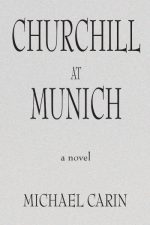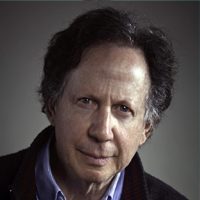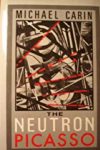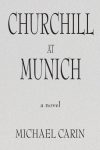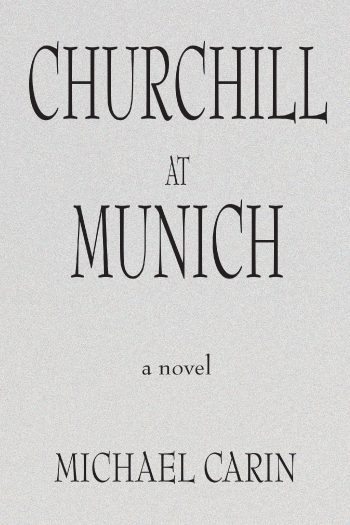Churchill versus Hitler:
an excerpt from
Churchill At Munich
“By his father he is English, by his mother American, to my mind the blend which makes the perfect man.”
– Mark Twain
The date is September 28, 1938. It is over a month since Neville Chamberlain’s death in a plane crash, and King George’s appointment of Winston Churchill to Downing Street. The Munich Conference has begun. The following exchange, narrated by Churchill’s interpreter, takes place during the prime minister’s first meeting with Hitler. Churchill has just asserted his confidence that the results of the negotiation will fulfill the greatest hope of the German people, namely that their Fuhrer will take a leading role in preserving world peace.
… Hitler replied in a quiet tone that did little to hide his contempt. “It astounds me,” he said, “that an Englishman would come to my table and presume to speak of ‘the greatest hope of the German people’, as if he could claim knowledge of their hopes. And not just any Englishman, but the champion of those who have urged nothing but shackles upon the German nation since its rebirth.”
Hitler did not look at Mr. Churchill as he said this, but rather at his own hands which fisted and unfisted in an idiom of coiling and warning. When I was done translating, Hitler added in the same freezing tone: “There is only a single matter of substance to be discussed here. We are dealing with the blood of my people, the life of the German nation, and no one will ever again dictate terms to it.”
Mr. Churchill removed his reading glasses and sat back in his chair. His voice was sociable. “Surely our task today should be to put aside our rivalry. Can we not give it a seat remote from these deliberations?”
Hitler was looking at his hands again, which were palms up now, fingers enquiring like a devotee’s in church. He sounded almost gracious when he said, “A tragedy, the death of Herr Chamberlain. The British people should know their grief is shared by all Germans.”
To this snide detour Mr. Churchill replied dryly, “I am sure our officials in Berlin expressed appreciation for such liberal solicitude.”
“A sadder and greater tragedy came after Herr Chamberlain’s death,” Hitler added. “He was not yet cold in his grave when his successor shattered his legacy.” The German leader inclined his head slightly to Schmidt. We heard the interpreter whisper Ja, mein Führer to confirm my translation had been accurate.
Mr. Churchill smiled. The briefing notes had warned of Hitler’s blunt disrespect. The PM was prepared for churlish intolerance and erratic turns. His smile said that now he had seen it, he believed it.
Hitler was not finished. “I am convinced Herr Chamberlain and I would have avoided the precipice to which his successor has led Europe. A man of conciliation is gone. A reckless warrior swaggers in his place.”
The PM said, “Most interesting, what you say about my predecessor. People had an impression of Mr. Chamberlain that it would be easy to cheat him at cards, because it would never occur to Mr. Chamberlain that anyone playing cards with him would cheat.”
My counterpart across the table hesitated. Before Schmidt spoke he glanced at me and was given a level look back. His translation kept faith with Mr. Churchill’s affront.
“Gut!” said Hitler, whose face remained a blank mask. “Let us speak without chains,” and as if to demonstrate he pushed his chair back and rose to his feet. “I wonder if the Englishman at my table who writes books of history remembers the masssacre at Kaaden in 1919. We Germans remember it like yesterday. We remember it as family. A pack of predators at Versailles had just drawn absurd lines on a map and proclaimed the birth of a state. The Germans of the Sudetenland were caught within the absurd boundaries and did not want to be part of an invented country. They saw it as a betrayal, a reprisal. They marched in protest. Peacefully, calmly, innocently, they marched. The police, every one of them a Czech, opened fire. Ask the schoolchildren of the Sudetenland. They have not forgotten the seventeen killed, the scores maimed and injured. That was the baptismal experience of my people in what you call … Czechoslovakia.”
Hitler spat out the word as if it were a pulpy maggot in his mouth. He had paced the length of the room and back. Now he halted behind his chair, arms crossed. He did not look at Mr. Churchill. His gaze was fixed on the wall behind us, on a point somewhere above us. He spoke of how the artificial state dominated and oppressed its despised German minority. The tyranny inflicted upon the Sudetendeutsche was calculated, protracted and brutal. Their aspirations were ignored, their culture insulted, their history erased. They formed a quarter of the population yet use of their language in the civil service was strictly forbidden. Political power was denied them; civil liberties stripped from them. How could the greater German nation have allowed the subjugation to continue for two decades? Because the German nation was defeated, weak, defenceless. “Nicht mehr!”
The No more! issued like a whiplash. A change came into the room, an electricity not unlike the power in a theatre when an actor enthralls. Here was the Hitler we knew from newsreels addressing stormtroopers under torchlight. In that moment I grasped the root of his appeal … a talent to conjure pure ardour; an ability to breathe flame so as to ignite it in those with no ardour of their own.
We watched the German leader pace back and forth, his arms crossing and uncrossing, his voice by turns low, barely audible, then pitched suddenly shrill as if sprung from a trap. Occasionally he beat the fist of his right hand into the palm of his left. We were pupils, Mr. Churchill and I. This was a classroom and Hitler the instructor. Nothing in the instructor’s lecture, however, fascinated so much as his self-absorption. The tremendous arrogance of the man: I was seeing it, feeling it, the colossal conceit, the naked narcissism. Do not misunderstand my mention of the theatre. Hitler is not an actor. The superior air he wears is not only conscious and deliberate, he takes as a given that he is superior. The briefing files had warned, repeatedly and vividly, of Hitler’s high-strung nature, his tendency to erupt in rage, but that is not what we were seeing. This was not an eruption, nor was it a rage. There was wrath in him certainly, a steady pulse of wrath, but what we were witnessing was more like a controlled tantrum, an adult conniption. He might have been a man inhabiting an hallucination. Perhaps that’s why his speech followed no order, meandered into digressions, became a rambling harangue replete with Nazi boilerplate about sinister influences in London, Moscow, New York. He was oblivious to his listeners; they did not seem to matter. What mattered more than his listeners and more even than what he was saying was that he was saying anything at all, because it was him saying it. He, the fuhrer of all Germans, exposing lies, correcting history, addressing posterity, erecting Truth. If his screed had a theme it was that the world was hostile to his government because the world had always demonised German exceptionalism. The anti-German illness in the world’s spirit had only been stoked by the signers at Versailles. The criminal tumour of Czechoslovakia and the oppression of its German minority were conspicuous symptoms of this antique, ever-renewing sickness.
“Nicht mehr! Today I speak for the Sudetendeutsche. They are no longer weak and defenceless, precisely because I speak for them. Do you think I will abandon to serfdom members of the German nation, any members anywhere of the German nation? Our Sudeten brothers and sisters must be liberated from the yoke of Czechoslovakia. I, Adolf Hitler, will restore them to their proper home.” With that the leader of Germany resumed his chair.
I dared not lift my shirtsleeve to peek at my wristwatch, but it felt like twenty minutes or more since Hitler’s pacing and arm-crossing began. He now gazed across the table at Mr. Churchill, though I sensed his eyes were still directed inward.
Throughout the diatribe Mr. Churchill had sat with his elbows propped on the table, fists supporting his chin. Crinkles around his eyes occasionally suggested tremors of amusement. I also heard a few intakes of breath articulating revulsion. The Prime Minister took his turn in a slow, measured voice.
“Herr Hitler, you spoke earlier of my predecessor. It happens that the good Mr. Chamberlain, may he rest in peace, inherited much of his attitude to foreign affairs from his predecessor. You remember Mr. Baldwin, of course. Who could forget a Prime Minister of England who so deliberately and supinely turned invisible in the bright light of international events? When your friend in Rome sent his troops into Abyssinia, Mr. Baldwin kept to the wings of the arena and whispered soft words. He also fiddled a conciliatory tune when German troops marched into the Rhineland. It was a heartening day for many when the reticent Mr. Baldwin took his retirement, but into his small shoes stepped a man for whom we soon learned reticence was next to godliness. The good and decent Mr. Chamberlain, whose demise you are certainly right to mourn, held back and did nothing when you helped your friend in Spain bomb and strafe and slaughter his own countrymen at Guernica. The demonstrations of timid and pious statecraft you came to expect from London gave you a free pass into Austria, a proud country which you have since humiliated and erased from the map. Now you propose to dismember another small state, to achieve ends which can easily be imagined. I am here to tell you that the kinfolk of the German people in the Sudetenland deserve the same freedoms of any people anywhere. I am here to tell you I wish to find ways to satisfy their just grievances and provide them a settlement of which they can be proud. I am also here to tell you this … that the representative of His Majesty’s government sitting at your table today is not cut from the same timber as his predecessors.”
